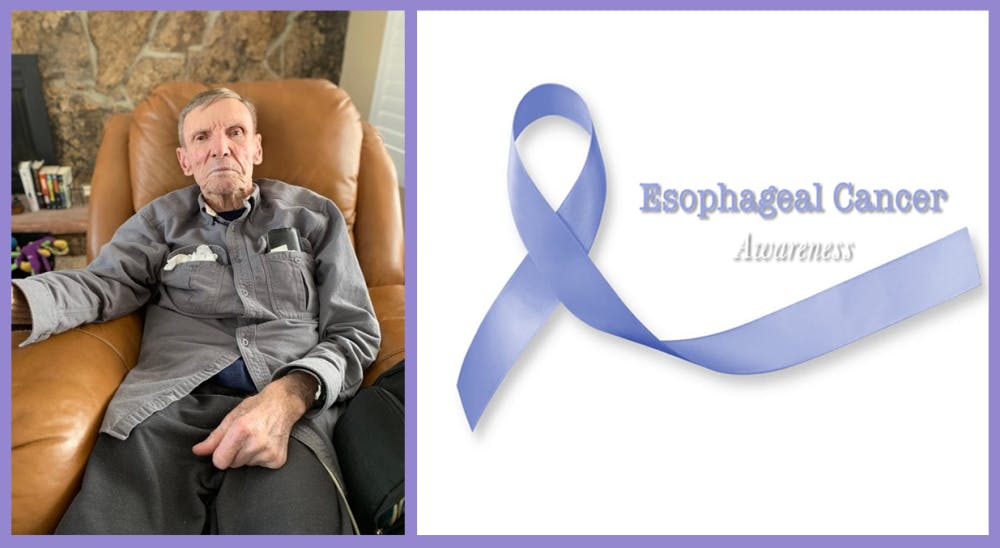Richard Trimble was 72 in December of 2011 when he was diagnosed with stage three esophageal cancer.
Not long after, Trimble had to give up his love for fishing and hunting, for a hospital gown, wool socks and a cold bed.

Along the shore of Boedecker Lake, sits a small, white house in Loveland. Inside is home to cancer survivor Richard Trimble and his wife, Raechel Trimble.
Back in 2011, Richard Trimble helped himself to a snack in the kitchen, while his wife did laundry and other chores around the house.
After a few bites, Trimble took a few sips of water and noticed a discomfort when he swallowed his food.
“It felt like I had a scratch in my throat,” he said.
Trimble called over his wife as she finished up on her cleaning task. He told his wife how difficult it was to swallow when he tried to eat. His wife scheduled an appointment with his primary doctor.
At the hospital, Trimble’s doctor looked down his throat and biopsied a suspicious mass. Later, the mass was confirmed cancerous. Trimble and his wife were distraught when the doctor told them the news.

“I was scared of course but the doctor reassured us he could save him,” she said.
In 2020, experts predict about 18,440 esophageal cancer cases are diagnosed. About 16,170 cases are deadly.
After hours at the hospital, the Trimbles headed home along with their fears, tears and many unanswered questions.
Trimble suffered sleepless nights after being diagnosed.“I remember coming home that night thinking I’ve got a death sentence,” he said.
Born in Minnesota, Trimble’s family lived a happy, middle class life. He was the middle child of his five siblings David, Bill, Ernie and Louise.
Their mother, Ida Irene Trimble, stayed at home to take care of the kids while the father, William Ernest Trimble, worked as an electrician.
At 15 years old, Trimble started smoking cigarettes. “I would smoke two packs a day,” he said. After 30 years, he quit. He was the only one of his siblings who smoked.
In 1965, Trimble enlisted in the Air Force where he applied sheet metal on airplanes. After three years, he was discharged from the military.
Two years after leaving the military, Trimble married Raechel Trimble in Minneapolis. The two of them settled in Champlin. Trimble’s wife was a stay at home mother to their three kids while he worked as a construction foreman in the sewer and water industry.
On his days off, Trimble packed up his gear to go hunt or fish. That was his happy place.
In 1982, his family moved to Colorado. Trimble’s construction job sent him on a two-year project but ended up lasting 42 years.
Trimble had a few health complications before his cancer diagnoses. Due to sun exposure from working outside, he developed skin cancer. He also had a pacemaker installed to help beat his weak heart.
After his stage three diagnosis, the best treatment was chemotherapy and radiation to shrink the cancer. Chemotherapy stops the growth of the cancer cells. Each treatment caused damage to Trimble’s healthy cells.
Raechel Trimble would attend every treatment. “After each treatment, the doctors took blood tests, endoscopes and a pet scan,” she said.
Trimble’s wife would spend days and nights with her beloved husband. She would follow all the doctor’s orders to keep Trimble stable throughout his recovery. From driving to chemotherapy, to taking Trimble to follow-up appointments, she would be right by his side.
“There are days where it becomes depressing when I don’t see a huge improvement,” she said. “Sometimes I feel I’m losing the battle of keeping him alive.”
After 35 chemotherapy treatments and seven weeks of radiation completed, the final stage was to surgically remove the cancer. After surgery, Trimble was cancer free.
Follow-up appointments happened once a week or every few months, depending on the progress of the cancer. Blood was tested every month.
“The surgery solved most issues but created more problems,” Raechel Trimble said.
Although treatments resolved the cancer growth, side effects occurred after each treatment. He felt weak and nauseated due to the radiation, and he experienced weight loss.
Before Trimble’s diagnosis, he craved eggs, potatoes, and meat and weighed 208 pounds. After his weekly treatments, he lost 73 pounds. To maintain his weight, doctors put Trimble on a feeding tube. He was on and off the feeding tube for four years.
Trimble also suffered from depression during his journey. With nonstop appointments and treatments, he didn’t know what to expect with each hospital visit.
After suffering from depression, Trimble and his wife attended Cancer Support to cope with his emotions and surround himself with cancer patients so he can relate and understand he wasn’t alone.
Trimble continues to live his life with his beloved family. He continues to fish and tag along on hunting trips with his sons.
“I never dreamed he would live this long. It’s been eight years,” Raechel Trimble said.







